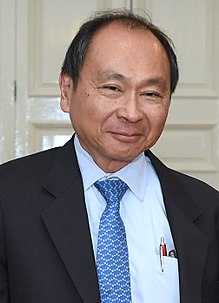
In his new book about the emergence of identity politics, Francis Fukuyama provides a crisp and compelling explanation of the recent transformations of the American left and right. The left, he writes, has shifted its priority away from the working class and toward "promoting the interests of a wide variety of groups perceived as being marginalized." The right, meanwhile, has been "redefining itself as patriots who seek to protect traditional national identity, an identity that is often explicitly connected to race, ethnicity or religion."
Fukuyama's book is titled Identity: The Demand for Dignity and the Politics of Resentment. It is a brilliant examination of the roots of our political polarization and deadlock. It is also a pleasure to read. But I was puzzled that his discussion of the politics of immigration oversimplifies the reasons for our government's failure to enforce the limits laid down by the Immigration Reform and Control Act of 1986.
IRCA, which is still on the books, was presented as a wise compromise that coupled a compassionate amnesty with promises of worksite enforcement to cut off the jobs magnet by penalizing employers who knowingly hired illegal immigrants.
"The country has been very inconsistent in the enforcement of its immigration laws over the years," Fukuyama writes. "This enforcement is not impossible, but is a matter of political will." Instead of building a wall to stop the illegal influx, he says, we should repair the current disorder by implementing a credible system of worksite enforcement that would accomplish what Congress promised in 1986. "This has not happened because too many employers benefit from the cheap labor that immigrants provide and do not want to act as enforcement agents," Fukuyama writes. He goes on to note the ideological resistance of civil libertarians on both the left and right to the effective worker identification system (E-Verify) that is essential to worksite enforcement.
I found this focus on the influence of employers strange because it overlooks the ample evidence that supports Fukuyama's thesis about the left's dramatic drift away from concerns for the working class.
Consider these mileposts of past Democratic concerns.
"My basic complaint is that we have a massive poverty population coming into the country virtually every day from Mexico," Walter Mondale, a Democratic senator from Minnesota, said in 1970. "If you could prevent that illegal rush of labor coming across the border, the bargaining power of U.S. citizens and permanent resident aliens would rise dramatically."
A year later, Rep. Peter Rodino, (D-N.J.) weighed in with this ominous assessment: "The illegal alien displaces American workers, depresses wages, burdens the welfare rolls, and taxes local, state and federal government by use of medical facilities at public charge." Rodino sponsored legislation to punish employers of illegal immigrants. It was passed twice in the House but failed to advance in the Senate.
Contrast those Democrats of the past with this 2017 statement from Sen. Kamala Harris of California. Addressing a town hall in Oakland, she said, "We are a nation of immigrants. And we have to stop vilifying and criminalizing whole populations of people because they came and arrived here from south of the border."
It was a remarkable performance from a rising liberal star widely touted as a potential Democratic candidate for president in 2020. Ignoring the legitimate concerns about illegal immigration that Democrats had long championed as the party of the American worker, she focused on the new liberal fixation on immigration limits as nothing more than a system of oppression and bigotry. That is the sort of contempt for the legitimate concerns of working people that could enable Donald Trump to win reelection.
